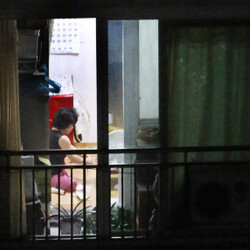hankyoreh
Links to other country sites 다른 나라 사이트 링크
Public-private sector partnership to prevent suicide

By Park Ki-yong, staff reporter
What if it were possible to pursue public goods such as reducing the criminal recidivism rate and the suicide rate while also giving the chance of tax breaks and even making some money? As part of efforts to prevent suicide among the elderly, the city of Seoul has decided to introduce an incentive program based on the idea of social impact bonds. The concept may be somewhat unfamiliar to South Koreans, as it has never before been used in the country.
A social impact bond-inspired incentive program adds to or subtracts from the funding provided to private-sector organizations that are carrying out social projects according to the outcome of those projects. The system is different from existing private-sector public services, which involve paying subsidies, in the sense that it involves bonuses and penalties that are applied after an assessment of the program’s results.
In Peterborough, England, social impact bonds were used to lower the criminal recidivism rate, while a system of this sort was also implemented in New York in 2012 with the aim to reduce recidivism among juvenile offenders who had been released from prison.
“We are focusing on assessing the results of the private-sector organizations who will carry out the elderly suicide prevention programs,” said Park Yu-mi, chief of the Seoul municipal department for public health policy, on Apr. 11. From Jun. 2013 to the end of 2014, Seoul will provide a total of 600 million won (US$531,151) in funding to organizations that are carrying out three public projects, giving a maximum of 200 million won to each. After the projects are completed, the outcome will be assessed. The organizations whose performance is outstanding will be given a 10% bonus on top of the project expenses, while organizations with lackluster showings will be given 5% less than the expenses.
After lending the organizations half of the project expenses from Seoul’s social investment fund, the city will have the organizations pay this back when the projects are over from the city’s budget. The organizations involved will carry out the suicide prevention program in 25 districts of Seoul that have already been selected. The program aims to reach elderly people who are 65 years or older and living in neighborhoods where the risk of suicide is thought to be high.
Social impact bonds are a type of social contract. They delegate public interest programs to private sector organizations that have expertise in the area, just as the elderly suicide prevention program in Seoul does. They also bring in private sector funding to reduce the strain on the budget. With local governments like Seoul guaranteeing the payment, the private sector companies carrying out the work can use this guarantee to attract investors to provide funding. When the project is complete, local governments give a bonus to the private organization according to the results, and part of this bonus is given back to the investor as profit. Local governments solve social problems and reduce their budget, while investors make money.
The Seoul model is different from examples in the UK and the US in that it is missing the part about attracting private-sector investment. Seoul explained that at present there is no legal or structural basis for the central or local government to guarantee payments.
“Social impact bonds offer a model for implementing welfare programs that is capable both of meeting the needs of a limited budget and satisfying increasing demand for welfare. We have adjusted the model according to the current situation in Seoul,” said Hwang In-sik, an administrative manager for Seoul City Government. “We expect that the ability of private-sector organizations can be used to bring about real results in suicide prevention.”
Interested organizations may submit applications starting on Apr. 18, 2013. The organizations will be selected in May and Seoul will start the projects in earnest starting in June. Any non-profit, private-sector organization with offices in Seoul can apply, including those that are registered with the city of Seoul or government agencies.
Please direct questions or comments to [english@hani.co.kr]

Editorial・opinion
![[Editorial] Japan’s rewriting of history with Korea has gone too far [Editorial] Japan’s rewriting of history with Korea has gone too far](https://flexible.img.hani.co.kr/flexible/normal/500/300/imgdb/original/2024/0422/1717137715201877.jpg) [Editorial] Japan’s rewriting of history with Korea has gone too far
[Editorial] Japan’s rewriting of history with Korea has gone too far![[Column] The president’s questionable capacity for dialogue [Column] The president’s questionable capacity for dialogue](https://flexible.img.hani.co.kr/flexible/normal/500/300/imgdb/original/2024/0422/1517137717613239.jpg) [Column] The president’s questionable capacity for dialogue
[Column] The president’s questionable capacity for dialogue- [Column] Are chaebol firms just pizza pies for families to divvy up as they please?
- [Column] Has Korea, too, crossed the Rubicon on China?
- [Correspondent’s column] In Japan’s alliance with US, echoes of its past alliances with UK
- [Editorial] Does Yoon think the Korean public is wrong?
- [Editorial] As it bolsters its alliance with US, Japan must be accountable for past
- [Guest essay] Amending the Constitution is Yoon’s key to leaving office in public’s good graces
- [Editorial] 10 years on, lessons of Sewol tragedy must never be forgotten
- [Column] A death blow to Korea’s prosecutor politics
Most viewed articles
- 1Samsung barricades office as unionized workers strike for better conditions
- 2[Editorial] Japan’s rewriting of history with Korea has gone too far
- 3[Column] The president’s questionable capacity for dialogue
- 4Korean government’s compromise plan for medical reform swiftly rejected by doctors
- 5[Reporter’s notebook] Did playing favorites with US, Japan fail to earn Yoon a G7 summit invite?
- 6[Column] The clock is ticking for Korea’s first lady
- 7[Column] Are chaebol firms just pizza pies for families to divvy up as they please?
- 8What Israel’s ‘warning shot’ response to Iran means for Middle East tensions
- 9[Column] Has Korea, too, crossed the Rubicon on China?
- 10Korea protests Japanese PM’s offering at war-linked Yasukuni Shrine